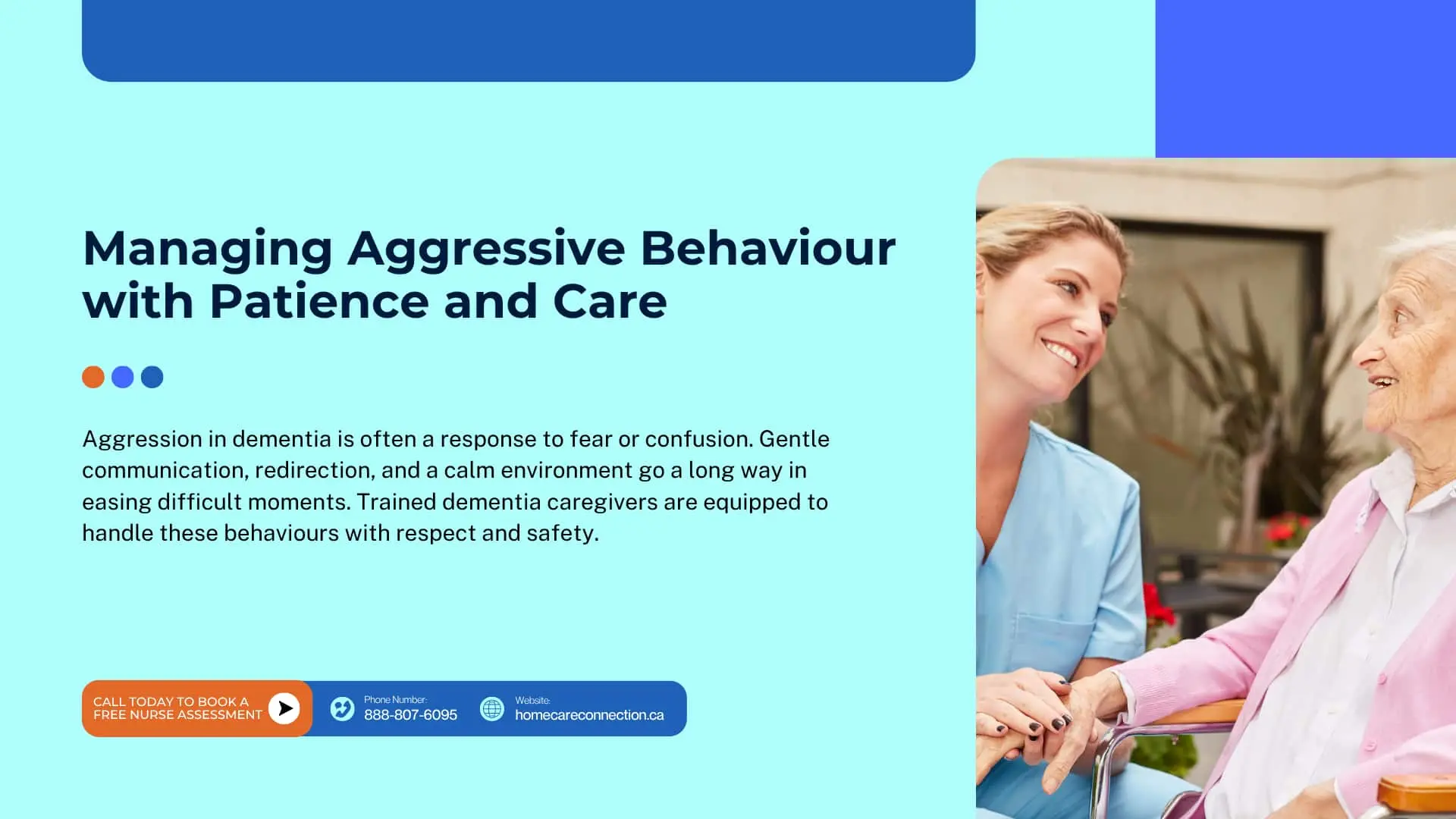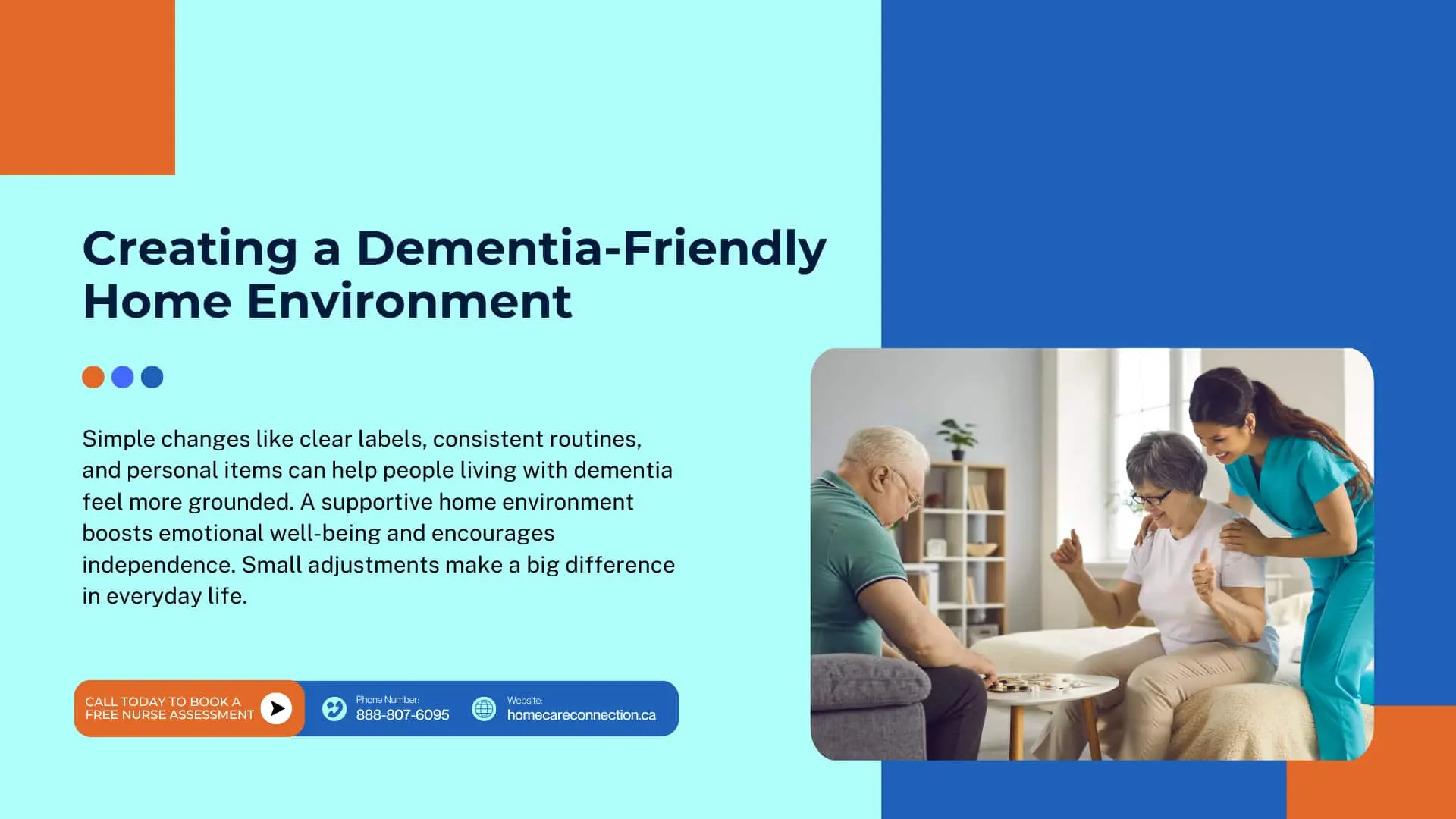Dementia affects countless families across Canada. For many, caring for a loved one with dementia at home is both a heartfelt responsibility and a daily challenge. From memory loss to changes in behaviour, the experience can be overwhelming, but you’re not alone. With the right support, caregiving becomes more manageable, and your loved one can continue to enjoy comfort and familiarity at home.
At HomeCARE Connection, we offer in-home dementia care designed to support individuals with compassion, patience, and understanding. This guide will walk you through what dementia care really means, the realities of caregiving at home, and practical ways to create a safe, nurturing environment.
What Is Dementia Care and Why Does It Go Beyond Just Help at Home?

Dementia care is more than just helping someone get dressed or take their medication. It includes emotional support, mental stimulation, and daily routines that help people living with dementia feel safe, connected, and valued.
Our approach focuses on building meaningful relationships and promoting quality of life. Dementia home care allows individuals to stay in familiar surroundings, where care can be shaped around their unique needs and personality. Professional caregivers can provide everything from help with personal care to managing difficult behaviours—like confusion or aggression—in a way that feels respectful and calm.
The cost of dementia home care can vary depending on how much support is needed. Families often find that working with experienced providers helps them make clearer decisions, both emotionally and financially.
Caring for a Loved One with Dementia at Home
Being a family caregiver often means juggling your own life while providing care at home. This is especially true for the “sandwich generation”—those supporting aging parents while also raising children or working full-time.
Balancing Life and Care
Respite care is one way to catch your breath and avoid burnout. Even short breaks give caregivers time to rest and come back with more energy. Joining a support group also helps. Talking to others who understand your experience brings reassurance and helpful tips you might not get elsewhere.
Everyday Care: What It Looks Like
Daily routines provide structure for someone with dementia. These tasks may include:
- Personal hygiene
- Preparing meals
- Medication reminders
- Safety supervision
Keeping things consistent is key. Whether it’s waking up at the same time or eating meals together, routines help reduce confusion. In-home care services can also offer professional support, especially during difficult times or as dementia progresses.
In-Home vs. Dementia Care Facilities: What’s Right for Your Family?
Choosing between care at home and moving a loved one to a facility is a big decision.
Home Care Supports Familiarity and Comfort
In-home dementia care allows individuals to remain at home, surrounded by familiar sights and routines. This comfort can lower stress and reduce symptoms of dementia. Trained caregivers can visit as needed—offering personal care, companionship, or help during the day or night.
Care Facilities Offer Structure and Supervision
Dementia care facilities have staff trained to manage more advanced needs. These environments often provide social opportunities and 24/7 supervision. However, the cost is typically higher, and some people with dementia may struggle with the change in surroundings.
Talk with your family and care provider to consider what fits best. Look at how much care your loved one needs, how they handle change, and what makes them feel safest. Sometimes staying at home with flexible care is the best option. In other cases, long-term care facilities may provide needed support.
Managing Aggression or Confusion in Someone with Dementia

Dementia may cause sudden mood changes or aggressive behaviour. These moments can be scary, but they often come from fear, pain, or confusion—not anger.
Understanding the Triggers
Aggression in dementia often happens when someone feels threatened or misunderstood. Loud noises, changes in routine, or discomfort can lead to outbursts. Communication difficulties also play a role; if someone can’t express a need, they may react physically.
Calm Strategies That Work
You can:
- Stay calm and use a soft voice
- Offer reassurance and make eye contact
- Gently change the subject or suggest a calming activity
If these situations happen often, trained dementia caregivers can help. They bring experience and calm techniques that protect both the caregiver and the person receiving care.
Creating a Dementia-Friendly Home

Small changes around the house can make a big difference.
Home Safety Tips
- Install bright lighting to reduce shadows and prevent trips
- Use grab bars in bathrooms
- Lock up cleaning products and sharp tools
Memory-Friendly Tools
- Label drawers, rooms, and personal items
- Use daily routine boards
- Display family photos and keepsakes
Comfort and Routine
- Play music your loved one enjoys
- Stick to consistent mealtimes and sleep schedules
- Keep noise and clutter to a minimum
A dementia-friendly home environment supports independence and lowers anxiety. As dementia progresses, simple adjustments like these can keep your loved one feeling safer and more at ease.
The Future of Dementia Care: What’s Ahead?
More support is emerging for people with dementia and their families.
New Tools and Technology
Memory aids, reminder apps, and even virtual reality tools are being explored to help slow cognitive decline and improve quality of life.
Community and Policy Changes
Public awareness is growing. Community-based care services and dementia education programs are making it easier for caregivers to find help. Policies supporting flexible home care options are also expanding.
With time and effort, we hope to make caring for a loved one with dementia at home easier, more supported, and more sustainable for families.
Final Thoughts
Caring for someone with dementia is a journey, one filled with emotion, effort, and deep love. Home care offers a compassionate, flexible option that allows individuals to remain in the comfort of their own home, surrounded by people who know and care about them.
Whether you need help managing daily tasks, navigating aggressive behaviours, or just want to talk with someone who understands, support is available. With the right approach, dementia care at home can preserve dignity, reduce stress, and make each day a little easier.
Frequently Asked Questions
What is dementia care? Dementia care focuses on supporting the physical, emotional, and cognitive needs of people with dementia. It includes daily assistance and support tailored to their specific challenges.
What challenges do caregivers face? Family caregivers often deal with exhaustion, emotional stress, and balancing multiple roles. Without help, burnout becomes a real risk.
How does home care support someone with dementia? Home care supports people with dementia by offering familiar routines, one-on-one attention, and professional caregivers who can manage complex needs.
What are the costs of in-home dementia care? Costs vary depending on care hours, services required, and where you live. Talk with care providers to understand your options.
How do you manage difficult behaviours in someone with dementia? Start by identifying triggers like pain or confusion. Use calm communication, redirection, and soothing activities. In more difficult situations, trained caregivers can step in.
What are the benefits of a dementia-friendly home? It increases safety, reduces stress, and helps your loved one maintain some independence. Clear signage, simple routines, and familiar items go a long way.
When should you consider respite care? When you’re feeling overwhelmed or need time to recharge. Regular breaks keep caregivers healthier and improve the quality of care.
How do you choose between in-home care and a facility? Base the decision on your loved one’s needs, comfort with change, and what makes them feel safe. Talk with professionals and your family to find the best fit.






